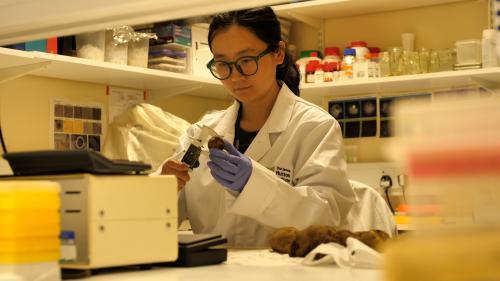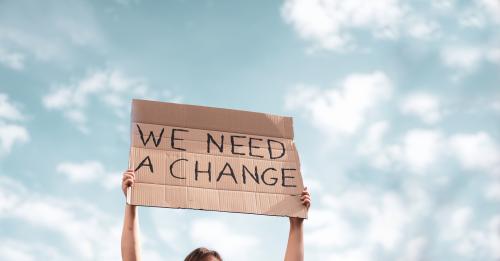Climate change affects everyone, but the impacts are felt in different ways by different people all over the world. Countries with lower socioeconomic status are often hit harder, alongside countries and populations that rely more on their economy and environment for natural resources. Profession, as well as location, also ties into how individuals may be impacted. For example, farmers can be some of the hardest hit by changing global climates, as unpredictable weather and rainfall damage agricultural yields. Similarly, different demographics respond to the crisis in different ways. For example, young people are particularly concerned about the climate emergency and passionate about change, but they can feel overlooked and underrepresented.
The climate emergency has complex, far-reaching and endlessly nuanced implications for everyone individually and collectively, across all demographics and aspects of society, in the UK and around the world. But there is one particular disparity I would like to focus on here, which is the role of women in the climate emergency and what they face.
I had not really thought about the gender imbalance in the climate crisis, until I noticed the time and resources devoted to the topic at the most recent COP climate conferences. A full day was dedicated to the ‘Gender in climate change’ theme at COP27 in Egypt last year, and to me, it felt like suddenly people are starting to talk about it. My curiosity was piqued, and I began to look further into the topic, which goes deeper than I, and you, may first think.
Globally, women are more likely to drop out of school to tend to the home. This can be for a multitude of reasons (including personal circumstances, cultural, economic, environmental etc.) but the tendency is often amplified more when natural disasters and extreme weather strike. At such times of unrest women can also be exposed to an exacerbated risk of harm. Globally, women are more likely to live in poverty and lack financial independence, making it harder to flee from extreme weather events or live and work in safer urban environments. Therefore, not only can women be among the worst affected, but studies by Yale University Climate Communication have shown women to consistently see climate change as more of a problem, posing a greater health risk, and they are more motivated to take action against it.
However, despite seeing the need for change, and bearing a disproportionate burden of climate change impacts, women are still largely underrepresented on the global stage in policymaking, management, research and science. But they need to be part of the solution!
Some of the challenges for women getting involved might surprise you, as some such issues still exist closer to home, here in Scotland and the UK. While access to STEM (science, technology, engineering, and maths) education is clearly not exclusively a gendered problem, women remain underrepresented in STEM fields. In 2022, Universities and Colleges Admissions Service (UCAS) data, showed only 35% of graduates in STEM fields were women.
Compounding the problem further, retention rates for women in STEM are sadly also lower. This is often due to barriers faced in their careers, making breaking glass ceilings as important as ever in order to pave the way for women to have careers in STEM. Getting women into science, technology and data fields, and at the very cutting edge of new technology and keeping them there, together with their motivation for change, will help the drive to find solutions. Especially as an extra push for much needed change in the climate crisis cannot come too soon.

| Showcasing excellence: a celebration of some incredible SEFARI women | SEFARI - Check out this blog post which looks at the work of some SEFARI women who are making a difference, and get inspired! |
Women are also still underrepresented in politics in many countries. In 2021, a record-breaking number of women were elected as MSPs into Scottish Parliament, which brought the proportion of female MSPs to 45% - but this is still less than half. However, both environment cabinet positions in Scotland and the UK, are currently held by women. Whilst this is really encouraging in countries such as Scotland and the UK where the situation is clearly improving, women remain underrepresented in global politics. Sadly, women achieving their place in politics is also not the full answer as there is still work to do around attitudes to women who reach these positions. The recent resignation of First Minister Nicola Sturgeon has rekindled talk around the darker side of women in politics, owing to Ms Sturgeon’s well documented history of receiving misogynistic messages and threats during her time in office. In her frank discussions around the difficulties and scrutiny women face, she even refers to the intense criticism as ‘brutality’ in politics during her resignation speech.
Despite the challenges women face, it is not all doom and gloom - change is happening. I’ve discovered there are some amazing female collaborations doing some fantastic work and this really shows just why we need more of them working in science and policy. One such example, is the rural knowledge network which is supporting rural Arctic women with the transition to net-zero. Female policy makers, scientists and practitioners from across Scotland, Canada, Norway and Sweden are getting together to generate and identify the best knowledge and advice.
A project by women, for women.
The project team includes Ana Vuin, Alexa Green (both from the Rural Policy Centre at Scotland’s Rural College), Jayne Glass (from Uppsala University) and Bregje van Veelen (from Lund University), who are collaborating to bring together their regional and international expertise. The project team is collating positive and negative case studies from women across the Arctic countries and has set up a foundation for more research to help to promote further change.
In Scotland, over 70% of social enterprises are led by women, and more than a third are based in rural areas. However, even though women clearly have considerable community involvement, their perspectives are often overseen or neglected despite the range and impact of their contributions which involve holding multiple community and household roles, unpaid labour, and social and voluntary activities. Therefore, and in collaboration with InspirAlba and Scottish Rural Action, the project team are gathering Scottish rural female entrepreneurs, from different organisations and backgrounds, to collect their experiences and draw attention to the vital work of women.
The project recognises the need to evaluate women’s contributions, but also acknowledge their value and encourage them to collaborate even more to get their voices heard. By working together with members of policy networks, entrepreneurs from the public sector and community-based initiatives, the project aims to create a strong, sustainable, and supportive network. Actively supporting the contributions women make, especially as we transition to net-zero, could make a crucial difference. Hopefully, relationships will be fostered that enable women’s expertise to feed into policy and practices for the future - making a difference both to their communities and to climate action.

As I have discovered, gender climate inequality is beginning to garner the spotlight it deserves. Although we have seen some inspiring progress, we still have a long way to go. We need to focus on empowering women and girls to get involved with science and engage fearlessly with climate research and politics, at all stages of their life and education. We need their input in technology, science and policy, and we need to inspire them to take control of their futures, wherever they live.
Climate change might just be the most formidable problem we will face, and it needs immediate, collective and substantial action. Uniting globally, across barriers and demographics is the best way to do this, and women can make a real difference that is overlooked at our peril. The fight against inequality and climate change are inextricably linked, and we should never stop pushing to give everyone an equal seat at the table, as the issues affect us all.
If, like me, this topic is interesting to you, then there are plenty of resources out there where you can learn more, and I have listed some I found at the end of this blog. I’d like to encourage you to consider inequality in your everyday lives. Encourage the women in your life to stand up for what they believe in, get involved in science and politics, stay ambitious and challenge the status quo. Look out for amazing female run projects, like the Arctic Women project mentioned in this blog, and in the wake of International Women’s Day, take the time to learn more about what is being achieved. Finally, make small changes to reduce your carbon footprint (as it all counts!) and push for much needed change - not only in climate policy, but also in gender equality.
Daisy Ellis, who has been on work placement with SEFARI Gateway and is pursuing her MSc in Science Communication and Public Engagement MSc at the University of Edinburgh.
Want to read more? I’d recommend….
